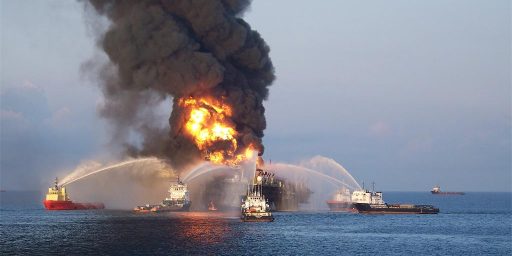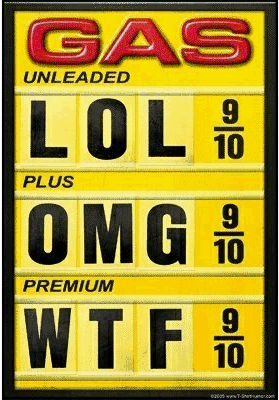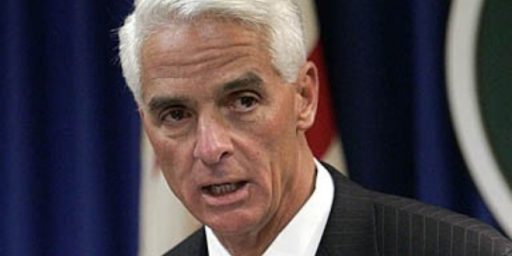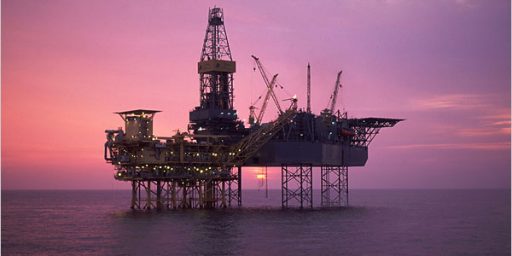Gas Prices Inflated by Government Policy
An amusing mock sign shows that gas prices are artificially inflated by our refusal to drill in the Arctic National Wildlife Refuge and offshore.
Via E. Frank Stephenson, who suggests we also “carve out 50 cents or so for taxes and a dollar or so for Ben Bernanke’s debasing the dollar.”
There’s not much doubt that our public policy choices, whether driven by environmentalism, protection for Florida real estate developers, or dealing with our national borrowing have had a significant influence on gas prices. I’m skeptical that it’s anywhere near this high, however.
I’m generally for responsible drilling in ANWR and offshore, investment in technologies to improve vehicle fuel efficiency and find alternative sources of energy, and whatever we can do to wean ourselves from the “dependence on foreign oil” we’ve decried since 1973. But the recent spike in gas prices reflects a convergence of global factors over which we have only limited influence.






Nearly all oil sales are denominated in dollars–Kuwait being the sole OPEC member eschewing them. So, no carve out for a depreciating or weak dollar here.
That is one of the reasons why the Arab Gulf States are seriously debating getting rid of the dollar peg for their currencies and the preferred currency for oil sales.
Complete and utter BS. Maximum throughput on the Alaskan pipeline system is a little over 2 million barrels per day. Currently we are pumping a little under 800k Bpd leaving about 1.2 million Bpd of unused throughput. Assuming that you could get physical yields of 1.2 million barrels per day from ANWR (not likely unless you drilled in an ultra destructive way) and you had the tanker fleet to haul it the addition of 1.2 million Bpd would not even cause a slight blip in the price of crude.
When the pipeline was shout down by an earthquake a couple years ago the spot price didn’t budge even before they knew the extent of the damage to the pipeline or how long it would take to fix. In fact the spot prince went down slightly.
Anyone who thinks that drilling ANWAR does anything other then make profits for oil companies, who won’t even drill there without massive government welfare, is a complete moron. The effect of the environmental lobby is all but null to the prince of gas. It’s a fiction created to dupe the gullible.
Oh and one more thing as long as we are playing this game. Add in the price tag of all government subsidies, giveaways and tax credits and the cost of the military adventures that are protecting the oil supply and shipping lanes and the cost of gas would be 5 or 6 dollars a gallon at a minimum.
Rick nailed it. Shame on you, James, for being enough of a hack to give this BS a bit of credibility.
Even with the pipeline constraints removed, though, it still wouldn’t matter. Fungibility, people.
Wow, Americans get some pretty cheap gas. In the UK we pay about $2.20 for a litre (about $9-$10/ gallon)
Chris – that is b/c of your taxes – also, your country is not exactly as spread out and you have a great mass transit system subsidized by the taxes on gas – I would love to see more mass transit systems in the US but the country is too rural in so many areas and there are not enough people to support it outside the major cities.
Rick, It’s more than just ANWR. There’s oil off the coast of California, the gulf coast, the Cubans are getting ready to drill in the Florida Straits. If a pipeline in Nigeria carrying 300,000 barrels a day is vital to world supplies then why discount our Alaskan supplies?
Every little bit helps. Whether it is new exploration and development or conservation, it all goes into the bin of supply and use.
To call this “complete an utter BS” is just extreme. Our government has refused to tackle this problem just the way it has refused to tackle many of the problems we face. We need to immediately get started on the 100 one percent solutions to our energy problems. Ridding ourselves of misguided government policies would be one of those solutions.
What’s so darn bad about oil companies making a profit? I believe each and every one of us is making a profit through work, business, or investments. Why not the oil companies? Or is it “Big Oil”?
Speaking for many of the “morons”, let ’em drill.
Well, Rick,
I seem to recall being told that the Pipeline was a waste of money because that field would only produce in it’s entire lifetime, about one tenth of what it’s produced thusfar. You’ll forgive me if I don’t take the dire estimates without at least a tablespoon of salt.
And as Steve points out, that’s just one field of many.
James, the sign has it right. Remember, we were told by Bubba Clinton that the reason he didn’t open up ANWR by signing the bill was because it wouldn’t help us for ten years. Well, it’s ten years., Do you suppose we could use the help, now?(/sarasm)
The sign has it right… the shortage situation is the direct result of governmental involvement. And that’s leaving aide the issue of the taxes which are placed on the oil compaies, even absent what we see at the pump.
Again, ….according to CNN Money, Exxon total “profits†if you don’t count exploration costs, were $40BUSD, in 2007. Their taxes, however, were $100BUSD.
Tell me again, who is making piles of money off oil… who is making obscene profits.
Not a thing. But if you think there is no relationship between the staggering profits that oil companies are currently making and the high price of gas, well, I have a bridge you might be interested in.
As far as Anwar goes, look, the end of the oil era is now in sight. Are we going to deal with it intelligently, or are we going to to be like a junkie desperately looking for a few more fixes and proclaiming that he will start going to NA meetings next week?
The right does not seem to think that America has what it takes to marshall our scientific know how and end dependence on 19th century fuel sources. Likewise, the condition that we leave the planet in for our children and grandchildren does not seem to count for much.
Yeah, well, tell me the Sheiks aren’t going to start pumping like mad at the threat of a new source coming online, thus lowering the price.
I seem to recall that being said around 50 years ago.
In the 50s? I would be interested in seeing some documentation on that…
It was being said in the 70s, and if we had done something about it as a nation, we would probably not be in the pickle we are in at the moment.
Oh yes, OPEC ministers can’t sleep at night for fear of the relative trickle of oil that ANWAR represents. Using generous estimates, ANWAR could supply the US with 5% of our oil for 30 years. Not a game changer.
Once upon a time, this country had a great mass transit system. Before Chevron & GM destroyed it. Crack a history book sometime…
I will presume you’ve never heard of the Hubbert curve, and suggest you do some research on same. The myth of the ‘end of oil’ has been around tha long, and has been disproven for those same 50 years.
Those who don’t learn from history, are Democrats.
Incorrect. Prudoe was supposed to generate far less than it has, and there is nothing to indicate that ANWR won’t outstrip even those outputs. Further, even assuming your 5%.. that adds competition, which lowers the price by far more than 5%, as Prudoe demonstrated rather nicely.
You ‘crack a history book’ sonny. The fact is what killed it off is governmental involvement.
One cause of gasoline production problems in the US is the balkanization of the gasoline market caused by the mandates for boutique fuels in different states.
It would help the market if the EPA just gave the refiners a tailpipe emission requirement and let the refiners produce any kind of gasoline blend as long as it met the emissions requirements.
This would also smooth the market disruptions caused by unexpected shutdowns of refinery production.
Price is important but supply even more so.
I find the resistance to drilling for oil and gas, and mining for coal, truly amazing. ANWAR should be on stream instead of still being the subject of discussion.
I wonder how the old Cold war warriors feel seeing the US doing to itself (cutting itself off from its own resources, and relying on uncertain supply lines) what the Reds probably spent a good deal of time trying to engineer.
Vast amounts of the most prospective areas for petroleum production are off limits by government fiat.
ANWR gets most of the attention but the east coast, west coast, large amounts of the rocky mountains, and offshore florida are also removed from exploration.
If congress wants to ban exploration that is a perfectly acceptable policy.
However this exploration ban has produced some world class idiot action / rhetoric out of congress.
One week they bring the oil company executives and brow beat them for not producing enough oil and gas. The next week congress votes to ban exploration in ANWR.
I guess only experienced savvy politician can combine large amounts of outrage over the lack of exploration with the ability to vote against additional exploration the next week.
We have a president that understands the need for strategic oil reserves. He continues to build them even as people say that action adds to the cost of oil. He says the amount is small in comparison to the world usage so the impact is light.
The same president and his cronies do not seem to be able to see ANWR and our off shore fields as strategic oil reserves. Why drill them NOW? If we had developed these fields 20 years ago, what difference do you think they would have made to today’s situation? What’s the rush? Lets pump the rest of the world fist and use our reserves at home when the tap starts to run dry.
Bithead says:
Okay… The Sheikhs aren’t going to start pumping like mad.
They can only pump as much as they’ve pumping capacity. The margin between what’s being pumped now and what could maximally be pumped is in the range of 2 mbd, for all the Arab members of OPEC.
The Saudis are just finishing up a 10-year project to increase production from 10.5 mbd to 12.5 mbd that cause a few billion dollars. Upping production another 2 will take another decade and another few billion dollars.
Convincing them that they should increase production while talking about ‘energy independence’ and spending like mad to subsidize ethanol production and other non-oil sources is another matter.
The last time they ramped up production, oil was selling at around $30/bbl. By the time production came on line, it was at $12/bbl. Saudi Arabia went into a deficit economy from the mid-80s ’til 2002. They aren’t eager to go there again.
Today’s situation wouldn’t exist at all, had we the foresight to drill there 20 years ago….
A look at the 80’s and their reaction to Prudoe will tell you that their stated capacity tends to vary according to the market, and their need to be in some degree of control of it.
Our drilling our own oil, trust me, is their biggest fear.
Bithead,
Oil self sufficiency in a free global market is a myth. Oil is fungible. Any reserves we develop become global oil unless we impose export restrictions. Had we added ANWR 20 years ago it would have lead to lower prices and greater flows that ultimately would have benefited China more than it benefited us. Lower price = more demand so Chinese growth may have been even greater leading to even more demand today. Funny how we all agree on the law of supply and demand until it is time to acknowledge the consequences. Some oil exporters are already looking forward to the day when most of their production is needed domestically. This is the real impetus behind the Iranian nuclear program; in a few decades they can use most of their production for internal use, or they can use nuclear energy for electricity and continue to earn export revenues for the difference. At the point the producing nations start to enforce export restrictions, ANWR and other undeveloped domestic sources will allow self sufficiency when self sufficiency becomes truly possible and necessary.
Letting everyone else deplete their resources before we deplete our own seems like a pretty good strategy to me. It is a lesson the Saudis appear to be learning.
Low and outside for a ball.
Look, I don’t care how big the market is. Do you suppose for a moment that even absent any other adjustments in the market, a 5% increase in world supply is going to not affect the overall price?
And I’m telling you; Each time someone else has come up with a new source, the Middle east has increased output and lowered price below the viability point of local fields. Domestic drilling will have that effect, at least, on top of the raw figures directly applicable to supply and demand.
My, you ARE a trusting soul aren’t you?
“And I’m telling you; Each time someone else has come up with a new source, the Middle east has increased output and lowered price below the viability point of local fields.”
So now that oil is over $100 we have all of those previously discovered un-viable resources ready to go, right?
They were viable previously, Fred.
Much of the costs were government imposed.
And ANWR is viable. And our ‘leadership’ decided against making use of it. Why, again?
Bithead –
I mean no disrespect, I just want to understand your logic …
If the the un-viable resources were impeded by Government imposed cost, why did the Mideast interests have to pump more oil to kill them? If we allowed development of ANWR now, wouldn’t the ME interests just pump more oil until it was not economically viable to develop ANWR anyway?
So the supply of oil is infinite? I see…
I’m 50 years old dude. A lot of the excellent public transit systems which were once plentiful in this country were in fact, municipal.
Oh, of course oil from the ME was cheaper for a bit, but is controlled with keeping control of the market in mind. Such is the nature of OPEC, just like any other union. When they’re the only players in town, they can charge what they like, and not pump quite so much as to maintain the price. Shen competition comes to town, they lower the price by pumping like mad, so as to keep the slightyly higher price fields offline. SO it is that instead of paying the $2/gal we could be, we’re paying four right now. I’m telling you; Make a commitment to pumping more domestic crude… including ANWR, offshore and whatnot and the Saudis and the Crazy Uncle Hugos of the world will react by dropping prices, by upping output.
No, but it is certainly not as limited as you’d like us to think. That much has been demonstrated clearly by the experience of the last 100+ years.
Ah. And government running them had no part in their demise, hmmm??
The fact is, mass transit is not a panacea. If it were, private concerns, such as railroads and operations like the old Rochester TRansit Corp would be still in business and making money hand over fist.
Why on Earth would I “like you to think” the supply of oil is more limited than it actually is? What you think is really not important to me at all.
What is important is looking to the future (which is not going to be based on oil) and using our countries scientific and business expertise to get us there, hopefully doing as little damage to the environmental on the way as possible. Or is your only concern your own comfort and pocketbook?
Where is this figure coming from? Anwar would cover about 5% of our domestic consumption for about 30 years, if there was some way to ensure all production was used strictly for domestic consumption, which is not realistic.
Even if we assume for arguements sake that Anwar would lower domestic prices 5%, I consider it a poor bargain for the possible consequences to the environment.
Who said its a panacea? Not I. But a better mass transit system would greatly mitigate many of the problems we face today.
My parents and grandparents got along just fine with the excellent public transportation systems which existed in LA and SF (where they were run by local governments). After the war, Cheveron & GM colluded to destroy most of the local rail systems and convert them to busses, which never have worked very well. But Chevron & GM did make a great deal of money.
I’d be shocked if ANWR budged the price of a barrel even a buck.
Policy no doubt affects the price of oil. But ANWR? That’s way, way down the list. Fred’s idea of saving it for later is also quite interesting, perhaps decades from now there will be more environmentally friendly means of extracting it and transporting it away.
Anyway, if you want to look at how policies affect oil prices, where I wonder would we rank the US’ idiotically short-sighted policy against funding family planning and birth control in foreign countries? Throw in the Catholic Church to the equation too. All those extra babies in the 80s are using oil now, and their kids will too. Granted, the impact isn’t probably that great yet because much of our efforts would have been in countries that don’t use a lot of oil per capita oil, but sooner or later it will bite us. And perhaps the impact is also not that much because our policies and programs might not have been very effective even if we tried to curb population growth. But it surely must rank as one of our more boneheaded policies that we actually want to encourage population growth in other countries, overpopulation has way more to do with the scarcity of oil and other natural resources than just about anything else. China’s one child law, while I wouldn’t want it here, might have been one of the single most important positive events for the American consumer (especially the consumer of 40 years from now) in the past century.
“… if you think there is no relationship between the staggering profits that oil companies are currently making and the high price of gas, well, I have a bridge you might be interested in.”
Their profits in these best years are only now in line with other corporations (8-9%) Profits, in case you forgot economics 101, are the real fuel of our society -without which the big government so many profit haters love, wouldn’t have anything to tax.
Drill, build refineries, nuclear power, and yes -windmills off Cape Cod and solar whatever. It beats the politician’s stupidity that a windfall profit’s tax will cause conmpanies to develop more energy.
No. It would make things worse, in fact.
Look, how many empty amtrak trains, how many empty city busses do we need to see to understand that such systems are not flexible enough to serve the transport needs of people without being wsteful?
Why on Earth would I “like you to think” the supply of oil is more limited than it actually is? What you think is really not important to me at all.
Which of course, is why you keep responding.
The usual tack is for us to think that oil is short, so, like global warming, it takes on the aire of a crisis, thereby pushing such nonsense as mass transit, and little Altoids boxes for personal transportation, what hasn’t been taxed out of existence. It should surprise nobody that you invoke both of these myths in your argument.
Perhaps. But it IS at least rather symbolic for our reluctance to drill where needed.
Really.
Look let’s see a show of hands, here. Here we are Again, ….according to CNN Money, Exxon total “profits†if you don’t count exploration costs, were $40BUSD, in 2007. Their taxes, however, were $100BUSD.
Now, who among us really thinks, in their heart of hearts that increasing the taxes on oil companies still further is going to bring down the cost of fuel?
I said a BETTER mass transit system. We are stuck with crappy city busses because your friends at Chevron got rid of most of the light rail systems we had in large cities, mass transit that actually worked.
I like to argue about politics. But I don’t really regard you as someone who is open to reason…
Anjin- you are correct about those mass-transit systems in the middle of Nebraska, Kansas, Idaho – my point was that mass transit is impossible outside major, well populated cities – you do realize not everyone lives in LA and San Fran and the northeast – don’t you?
Define “major” city. Des Moines seems to have a fairly well developed mass transit system, and it is not urban coastal.
http://www.desmoineswa.gov/serv_res/transportation.html
It’s interesting to read about the history of mass transit in Iowa. A bit of reading also gives lie to Bit’s claim that “government involvement” was responsible for the failure of mass transit. At least in the case of Iowa, there were private trolley lines which had a tendency to fail:
History of Public Transit in Iowa
Public transit has been serving Iowa since before statehood was achieved. Keelboats and paddle-wheelers carried passengers up and down the Mississippi River, stopping at river towns along the Iowa territory, while stagecoaches carried passengers overland.
Local transit operations got their start in the late 1860s with street railway systems springing up in many of the larger communities of the time. (Dubuque’s Dubuque Street Railway system, founded in early 1868 was the second public transportation system west of the Mississippi, and the first of many springing up in Iowa.) These generally involved horse or mule-drawn trolleys running on metal tracks laid in the dirt streets. They offered operating speeds of up to six miles per hour. They gave city dwellers the chance to get around town much quicker than one could walk, especially at times when the streets were full of mud or dust. Even for those with access to their own horses or wagons, the street railways offered increased convenience by avoiding the chores of saddling or hitching up horses for short errands or visits.
The development of steam engines and electricity quickly ended the reliance on animal power for public transit. In 1888 Des Moines became the second city in the nation to have electric rail service with the opening of the Broad Gauge Railway Company running along Locust Street and Grand Avenue.
During the 1890s and early 1900s, most of the existing street railways were either converted to or replaced by electrified streetcar lines. New lines were also developed through the first couple decades of the 1900s. Often a town would have several different companies providing service, each with its own line serving certain parts of town.
In many communities real estate developers established trolley lines to support new outlying neighborhoods which were beyond easy walking distance of the central business district. Others developed trolleys to carry people to amusement parks developed outside of town. In many cases these lines were not profitable in and of themselves, but contributed to the overall success of the developer’s projects.
Over time many of the individual trolley lines failed. In some communities this was the end to public transit. In most communities, however, the various electric rail lines were consolidated under a single operator, which was often the local electric utility company. Since the trolley systems tended to be among the heaviest users of electricity, this made some sense as a form of vertical integration. It also made sense to treat public transit service as a utility. But probably the main reason the services ended up being consolidated under the electric utility had to do with the tendency of the trolleys to go out of business owing very large electric bills.
>I don’t think anyone is arguing that rural hamlets should build mass transit. Of course I am more familiar with the issues where I live. I can tell you for sure that there is widespread support for a high speed train running SF-LA-San Diego. Yet we can’t seem to do something that Europe and Japan did decades ago. There is a reason for this, and I smell oil…
The history of the RTC I cited earlier is emblematic; It was set up because the bigger cities had them. Problem of course was, nobody wanted to ride the thing. Blame Chevron if you like, but it won’t wash. It’s called ‘voting with your feet’, and the people did just that.
Try exhibiting some.
A ways back in this thread you said mass transit failures were due to to “government involvement”. So which excuse is it to be?
Light rail was popular and enjoyed a high ridership in Calif after the before and after the war.(ww2) Certainly market penetration by automobiles is a factor, but there were then and are now a great many people who either cant afford cars, or would prefer to use public transportation if a decent form were available. The fall of light rail and rise of buses was not based on a lack of ridership.
I would be curious to hear your definition of reason. I am a Democrat, but Republican Chuck Hegel was my first choice for president. In fact, I was a member of the GOP who voter for Reagan twice before the Bush family ruined the party.
I oppose the war in Iraq, but strongly support our action in Afghanistan. I favor universal health care, but support welfare reform. I think we should exhaust all other possibilities before we go to war. I want to minimize damage to the environment.
What is unreasonable in this?
Do you consider the reasons listed to be mutually exclusive?
More than you’ve got time to read, I suspect.
And thereby can’t afford to pay a fare that’s high enough to keep the light rail rolling, either. Thus do we have yet another tax to add to automotive fuel. I suppose you can’t imagine how those issues are connected?
A weak response. I will make time. Show me where I am unreasonable. Your little quips simply show that you have not got much to offer in the way of substance. Put up or shut up…
How about proving this statement?
Do you have metrics on the average cost per rider per mile for mass transit systems in this country? Can you prove that someone who can’t afford a car cannot pay the average fair? Or are you just making it up as you go along?
What about a poor person who is frugal and hardworking? Maybe he just wants to get across town to see his Grandma. To hell with him? Don’t know about you but I am willing to pony up a few bucks to make transportation available to all, even if there is a subsidy for the poor. I am happy to help someone who has less then me and I can still afford to keep my 350z on the road 🙂
A kindness, actually.
And why would that be needed? The bottom line they all remain with one hand in my pocket, and wouldn’t survive otherwise. Clearly, whatever it is they’re not profitable.
What about a poor person who is frugal and hardworking? Maybe he just wants to get across town to see his Grandma. To hell with him? Don’t know about you but I am willing to pony up a few bucks to make transportation available to all, even if there is a subsidy for the poor
Fine then you go ahead and make arrangements for it… outside of government and without demanding the taxpayers support it. What you’re talking about is theft, not chairty.
Logic time:
The real costs involved with light rail systems are much higher than the fares would indicate, else they’d not be in our collective pocketbooks for their daily needs. Raise the fares to cover those costs, and the poor wouldn’t be able to support them.
In other words bit, you can’t back up your claim that I am unreasonable, and you can’t substantiate your claims about mass transit.
You just continue with your obsession that everyone wants to get into your wallet, which I suspect is not thick enough to be of much interest to anyone.
Actually, its neither. I pay taxes, probably more than most, and I am free to lobby my government representatives to spend it in ways that I see fit. I am also free to argue for my views on government spending in public forums. Its called freedom dude.
Our government is currently spending money on a great number of things that I do not support. But thats life, and it would be childish to portray it as “theft”.
I for one, am happy to see some of my tax dollars go to those who are less fortunate than I or who are where my grandparents were when they first got off the boat. A far better use, in my view, than the giveaways to billionaires that Bush is so fond of.